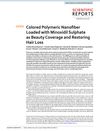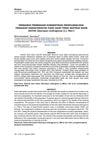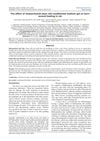 4 citations,
March 2020 in “Scientific Reports”
4 citations,
March 2020 in “Scientific Reports” Scientists created a colored thread-like material containing a common hair loss treatment, which slowly releases the treatment over time, potentially offering an effective, neat, and visually appealing solution for hair loss.
 July 2024 in “Scholars Journal of Medical Case Reports”
July 2024 in “Scholars Journal of Medical Case Reports” Combining low-level laser therapy and exosome therapy promotes hair growth.

Different amounts of propylene glycol change the thickness of katuk leaf hair tonic.
 29 citations,
September 2014 in “Current Opinion in Endocrinology, Diabetes and Obesity”
29 citations,
September 2014 in “Current Opinion in Endocrinology, Diabetes and Obesity” Finasteride and dutasteride effectively treat hair loss in men and women, but may cause side effects like low libido and depression.
 32 citations,
January 2008 in “Journal of Microencapsulation”
32 citations,
January 2008 in “Journal of Microencapsulation” Cosmetics with hinokitiol-loaded nanocapsules were found to effectively promote hair growth.
 12 citations,
March 2020 in “Journal of Bioactive and Compatible Polymers”
12 citations,
March 2020 in “Journal of Bioactive and Compatible Polymers” Nanoparticles show potential for controlled release of hair loss drugs, improving treatment effectiveness.
 20 citations,
September 2019 in “Nanomaterials”
20 citations,
September 2019 in “Nanomaterials” A portable device can create nanofibers to improve the appearance of thinning hair better than commercial products.
 14 citations,
March 2016 in “Cutaneous and Ocular Toxicology”
14 citations,
March 2016 in “Cutaneous and Ocular Toxicology” Synthetic cannabinoid addiction can cause skin problems like acne and hair loss.
 8 citations,
January 2018 in “PubMed”
8 citations,
January 2018 in “PubMed” Smaller finasteride particles increase effectiveness in treating hair loss.
 3 citations,
April 2022 in “Veterinary world/Veterinary World”
3 citations,
April 2022 in “Veterinary world/Veterinary World” The mesenchymal stem cell-conditioned medium gel improved burn healing and hair growth in rats better than other treatments.
 2 citations,
January 2022 in “Rasayan journal of Chemistry”
2 citations,
January 2022 in “Rasayan journal of Chemistry” Compounds from the Sansevieria trifasciata plant might be effective for treating hair loss.
 February 2024 in “Brazilian Journal of Implantology and Health Sciences”
February 2024 in “Brazilian Journal of Implantology and Health Sciences” PCOS often causes skin issues like excess hair, acne, and hair loss, needing early treatment.
 December 2023 in “International Journal of Biological Macromolecules”
December 2023 in “International Journal of Biological Macromolecules” Chitosan nanoparticles loaded with Minoxidil were effective for hair growth but released the drug more slowly than the amphiphilic derivative.
 October 2024 in “Journal of Advanced Pharmaceutical Technology amp Research”
October 2024 in “Journal of Advanced Pharmaceutical Technology amp Research” Trigonelline nanocrystal cream effectively promotes hair growth and may reduce side effects.
9 citations,
May 2021 in “BioMed research international” Human hair-derived particles can effectively carry and release the cancer drug Paclitaxel in a pH-sensitive manner, potentially targeting cancer cells while sparing healthy ones.
 1 citations,
July 2023 in “Biomimetics”
1 citations,
July 2023 in “Biomimetics” A new hair treatment using a natural polyphenol complex improves hair strength, reduces static, and protects against UV damage.
 February 2023 in “International Journal of Pharmaceutics”
February 2023 in “International Journal of Pharmaceutics” A new version of minoxidil, a hair loss treatment, was made using nanotechnology. This version, called minoxidil cubosomes, works better and causes fewer skin reactions than the old version. It also penetrates and stays in the skin better, promoting hair regrowth. It's safe and could be a good alternative to current treatments.
 130 citations,
January 2017 in “International journal of nanomedicine”
130 citations,
January 2017 in “International journal of nanomedicine” Silver nanoparticles coated with substances like PEG showed strong antibacterial effects and improved wound healing when used in hydrogels.
 39 citations,
April 2011 in “Recent Patents on Drug Delivery & Formulation”
39 citations,
April 2011 in “Recent Patents on Drug Delivery & Formulation” Nanoemulsion-based drug delivery systems are versatile and have potential for treating various medical conditions and improving vaccines.
 2 citations,
November 2021 in “International Journal of Applied Pharmaceutics”
2 citations,
November 2021 in “International Journal of Applied Pharmaceutics” The phytosome lotion made from Mangkokan leaf extract was more effective for hair growth than 2% minoxidil, especially at 30% concentration.
 January 2022 in “International journal of pharmaceutical sciences review and research”
January 2022 in “International journal of pharmaceutical sciences review and research” Herbal cosmetics are becoming more popular because they are safer, have fewer side effects, and offer health benefits.
 474 citations,
January 2012 in “Chemistry & biology”
474 citations,
January 2012 in “Chemistry & biology” Proteasome inhibitors are promising treatments for various cancers, autoimmune diseases, and other conditions.
April 2023 in “Journal of Drug Delivery Science and Technology” The new minoxidil gel improves hair growth and reduces skin irritation.
2 citations,
March 2021 in “Journal of nanoscience and nanotechnology” Nanoliposomes loaded with saw palmetto extract could be good for treating hair loss.
 April 2023 in “Jurnal Farmasi Indonesia”
April 2023 in “Jurnal Farmasi Indonesia” Candlenut oil and celery powder improved hair growth and could be a potential treatment for alopecia.
 August 2024 in “Frontiers in Nutrition”
August 2024 in “Frontiers in Nutrition” Antioxidant-rich diets may reduce hair loss risk, while pro-inflammatory diets may increase it, especially in women.
September 2023 in “Pharmaceutics” The new face mask with Eflornithine can potentially reduce facial hair growth and moisturize skin.
July 2021 in “International Journal of Applied Pharmaceutics” The finasteride nanogel could be an effective topical treatment for hair loss.

Higher levels of β-carotene and vitamin E may help prevent certain types of hair loss.
35 citations,
August 2016 in “Experimental Dermatology” Fullerene C60 shows promise as a new treatment for various skin conditions.























